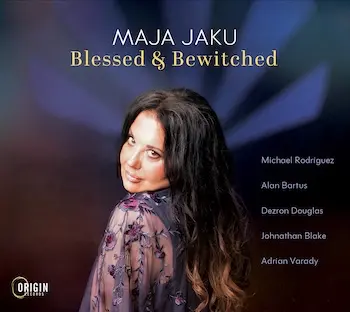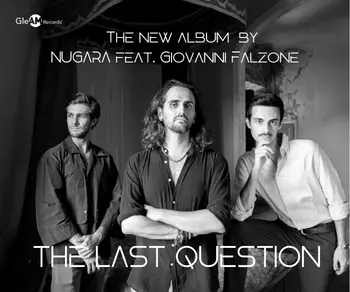Michika Fukumori: Eternity And A Day (Summit Records DCD 838)
One of those piano prodigies who started at three, Japanese-born Michika Fukumori has had music in her life from the start. Since moving to New York in 2000, she has honed her artistic skills and passion for jazz. Her fourth release is a piano trio album, Eternity And A Day, with bassist Steve Whippl and drummer Adam Nussbaum. Having worked with well-known pianist Steve Kuhn previously, Fukumori produced this album herself, further revealing her ability to lead as well as arrange and write her own material.
The first seven compositions are Fukumori’s. Like her previous work, they are delicate and sensitive in beautiful ways. On the title track, the bass, piano and percussion balance lovingly, tenderly. They dance about the wandering tune, showing off the breaths between sound and silence. Acaso is more lively. It moves away from the slower rhythms of the previous two songs.
Fukumori is an easy musician to listen to. Her work dances lightly, the compositions somewhat airy at times. Some might comment that they are too light, too tinkling. Yet, a great beauty lies in them, one that blossoms and unfurls as each piece (they are often on the long side, six minutes or more) gets underway, as with There Is Always Light. Though not containing the most pronounced melodies, her original compositions are very her. As in, you won’t confuse them with music by artists like Yoko Miwa, Miho Hazama, Fergus McCreadie, Alessandro Sgobbio, etc.
Choosing to organise an album with only the self-composed tracks up front is unusual. Many artists would include the cover songs, blended throughout. Speak Low, written by German-American composer Kurt Weill in 1943, is popular enough to require a careful approach. Lively without getting chaotic, Fukumori’s arrangement does the piece justice. Nussbaum works well in the background, sustaining and keeping the beat in order to push the track onward. The subsequent covers are equally well conceived and performed. Eternity And A Day may be slightly long, but the material is polished, the trio superbly balanced the whole way through.
Tobin Mueller: Fragments (Mirror Image Music Group)
Is a song ever truly finished? In jazz, a tune lives on in the fingers and instruments of the players. Multi-instrumentalist Tobin Mueller keeps the music alive by revisiting and reworking it on Fragments. Taking sections (or fragments…) of tunes written by people like Joni Mitchell, Paul Simon, Elton John, etc., Mueller adeptly creates something new and interesting. Though he focuses on a jazz-fusion sound, many other layers and influences are also apparent, from Latin to progressive rock. It’s a jovial and lighthearted project, the message behind that music is alive and well.
Remixes can explore the sonic differences as well as the similarities in styles and musical eras. Like Max Richter’s epic Recomposed (Deutsche Grammophon, 2012) where snippets are pushed and pulled through the creative process’s taffy maker, Mueller’s work finds a good middle ground between gushing homage and lukewarm tribute. As you’d expect with jazz fusion, the tracks can last longer than your normal pop tune. The length allows the music to morph and distort and come back together. Not quite the master of balance that Pat Metheny is, Mueller offers a variety of sonic textures. Electric Boots and All Come To Look For America are like patchwork quilts that blend snippets together without being heavy handed.
Not all the arrangements, though, work seamlessly. Learning to edit and pare down tracks is necessary so as not to lose the listener in all the interesting sounds and flavours being offered. Winding Road starts off strong; it is more gentle and subdued. It keeps going … and going. Yet, it does keep to a consistent overall tone, which helps focus the listener. The shifts in rhythm and pace can be off-putting occasionally. The release’s concept is wonderful; the musicians just got too excited, carried away in both emjoyable and slightly disorderly directions.
Hanna Paulsberg: Himmel Over Hav (Grappa GRCD4819)
Norwegian saxophonist Hanna Paulsberg likes to keep busy. One of the many groups she plays in, the Hanna Paulsberg Concept is one that is close to her musical core. Himmel Over Hav (or, Sky Over Ocean) brings her innovative practices into focus with a jazz sensibility. A mix of catchy, almost folksy tunes and more experimental sounds, the release bridges different genres without losing its sense of self. What’s more, the inclusion of special guest Elin Rosseland on vocals (the first time the ensemble has incorporated them) further blurs the lines of musical genres. One feels the Nordic winds and sees the brumous landscapes with this project.
Som En Fortelling belies what the album’s sound really is. With a glimmering piano intro and a dolce sax, the tune exhibits a more traditional style, slightly Bill Evans even. As the piece unfolds, a contemporary European jazz attitude emerges with piano runs and dance-like manoeuvres. Rosseland’s vocals often slip in and out, not always the song’s star but shining nonetheless. The way the players weave in and out of one another’s phrasing shows the group’s maturity and ability to listen and respond. Maria shows off their control and restraint. The wordless vocals further exhibit how in tune with each other each member is. The piece demonstrates a minimalistic approach that places Paulsberg in a higher tier of musicians and composers.
Perhaps following the Scandinavian archetype, Paulsberg peddles a soft sound. Free-styling is still part of the music, though. At times the music gets fuzzy, almost messy. Homer Wells lasts around nine minutes. And in those musical measures, things lean toward the hectic side, the looser side, especially with the vocals. This is where the ensemble may forfeit some listeners. Overall, though, the songs speak to a distinct voice, of the musicians and of the country they hail from.




